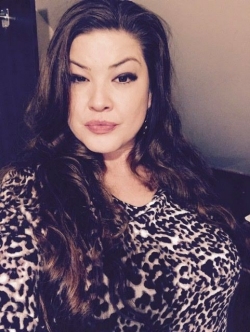When the remains of a Catholic priest were exhumed last summer from the grounds of a church in Kahnawake, Quebec — more than two decades after the alleged child sexual abuser was interred there without the consent of the Mohawk community — it was a testament to the activism of people like Melissa Montour, BA 16.
The alumna, Campaign for Concordia donor and Kahnawake resident has long served as a legal liaison and organizer. Driven by a sense that governance on the First Nations reserve — located across the St. Lawrence River from Montreal — should follow Indigenous knowledge and the tenets of the Iroquois Confederacy, Montour describes her university education as a pathway to credibility.
“I’ve always been a person who puts my people first,” she says. “And I was always interested in politics, because it affects everything.
“When I decided to enrol at Concordia, it was because even though I had worked in the community for years, I needed the sheepskin. I needed that piece of paper to prove that I belonged in certain spaces.”
‘Every little bit helps when you’re a student’
As an undergraduate and single mother with a pre-teen son, Montour found a second home in what is now called the Otsenhákta Student Centre, an on-campus resource for First Nations, Inuit and Métis students.
“They had an elder advisor, Morning Star, who was there when you needed to blow your stack,” Montour recalls. “Just somebody you could talk to, who understood what Indigenous students often encounter in the curriculum with regards to our history and our practices.”
Financial assistance, in the form of the Laura Tilson Memorial Bursary, helped, too.
Created by long-time Concordia staffer Cameron Tilson, BSc 82, and his wife, Wendy Morse-Tilson, in honour of the couple’s second child who passed away in 1994, the bursary was a welcome source of encouragement, says Montour.
“I had my own house and my son to take care of. Every little bit helps when you’re a student and need to pay your bills and put food on the table.”
The sacrifices Montour made as a student at Concordia recently inspired her to pay it forward and establish her own bursary for Indigenous single parents. Serendipitously, the first recipient, also from Kahnawake, was the younger brother of her childhood best friend.
Like his benefactor, Lawrence Montour (no relation) hopes to use his education to serve his community. With two daughters, aged 11 and 17, at home, he was grateful for the extra help.
“It’s not easy to keep up with your courses as a mature student, find work and be a good father at the same time,” says the first-year human relations major and First Peoples studies minor student. “So I was thrilled to be considered for the bursary — it made a difference.”
Lawrence Montour has also appreciated the array of services at the Otsenhákta Student Centre, where he has connected with other Indigenous students, and the land-based education program offered by the university.
One of his long-term goals is to open a family support centre in Kahnawake.
“There’s a lot of intergenerational trauma in our community and many economic and social problems that need to be addressed,” he remarks. “We could also use a new sports facility for our kids. I’d like to contribute to that in some way.”
‘I’m proud of how we stuck together’
As a current Master of Public Safety candidate at Wilfrid Laurier University, with a specialization in National Security, Melissa Montour says she now depends on skills she honed at Concordia.
“We had great professors who showed us how to think critically and build strong counterarguments,” Montour recalls. “It’s what I ended up being good at.
“The program at Wilfrid Laurier touches on national security quite a bit. There are specific public-safety issues when it comes Indigenous communities, and I’m actually running into a lot of material that’s offensive. I’m doing what I can to insert my opinion using sourced documents that properly contextualize and explain acts of Indigenous resistance.”
A specialized graduate degree, Montour hopes, will further legitimatize and empower her ability to effect positive change in Kahnawake.
The painful saga of Father Leon Lajoie, the aforementioned priest, still has her galvanized.
“I’m proud of how we were united and how we stuck together,” Montour says. “It wasn’t easy. People who had the courage to come forward were publicly victim-shamed. Others turned his grave into a kind of shrine, which was traumatic. When we won the plebiscite that decided the fate of his remains, it took me a while to register the outcome. It had been such a long and difficult process. But in the end, it was a huge victory for the victims and a huge step forward for our community to be able to heal.
“When it came to handling the issue with the Jesuits of Canada, we did everything according to our traditional teachings. I also want to acknowledge our People who live by the Kaianerekowa — Iroquois Constitution — and the strength and resilience our women showed in terms of their responsibilities regarding the land. Unity is strength and the key to freedom.”


 Campaign for Concordia donor Melissa Montour, BA 16
Campaign for Concordia donor Melissa Montour, BA 16